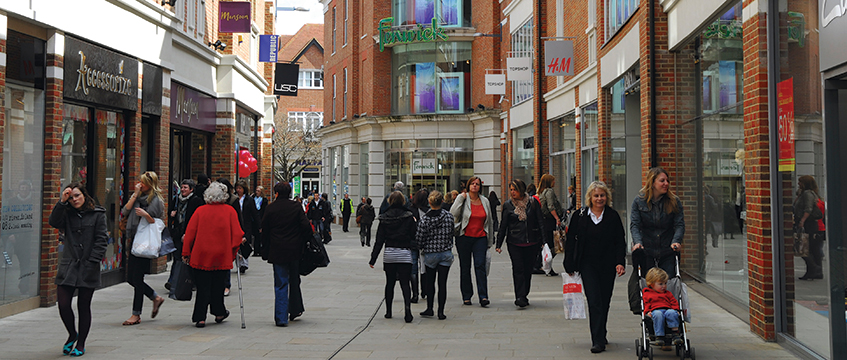There’s a lot of speculation that the UK is about to embrace a wholesale relocation to rural or semi-rural locations, but the reality is that our cities have seen off bigger challenges than Covid-19. Some people and businesses may choose to move due to the pandemic, but the majority won’t. In the long term, UK cities are likely to continue their upwards trajectory.
That said, in the short and medium term most face major challenges. While not downplaying the hardship of those businesses that will struggle to survive this recession, this moment does provide an opportunity to take stock and think anew of what direction development in UK urban centres should take to ensure sustainable economic and social recovery. It’s a pattern we’re seeing replicated globally, with clients asking fundamental questions about how we travel to and use city space.
Most UK cities and large towns are still modelled around high streets, which will need to look to those who live nearby to support their survival. People are currently shopping and exercising more locally so co-operation between the private and public sector, plus other organisations such as BIDs, to create safe and welcoming spaces is crucial to maximising the benefits of post-lockdown footfall. Finding solutions to open vacant and civic spaces to provide outdoor and more permeable trading areas is vital. As property developers, agents and managers we need to think creatively about making these changes happen quickly and safely.
Sense of community
Looking beyond that to a post-Covid-19 world, chain retail will still have a role, with eight out of 10 retail transactions touching a store in some way as consumers demand quick and easy delivery and returns. But landlords may want to focus on smaller independents.
With the public having largely realised that if they didn’t support these local retailers during lockdown they wouldn’t survive, many have seen an upswing in sales, and there’s an opportunity for landlords to continue to support these retailers.
Covid-19 has reinvigorated a sense of community and the property industry needs to help maintain the connection that people have built with their local city centres during lockdown. Putting smaller retailers at the heart of recovery will help create the characterful, individual offers that will set centres apart from one another.
In addition, an independent retailer’s covenant is potentially stronger than a chain’s to a landlord in the current environment, as the former is often an individual’s or family’s passion and they will do everything possible to make their business succeed.
Bookends to society
But the city’s future is also about fully integrating living and working beside retail and leisure, with no silos between different uses.
We need to re-urbanise town and city centres with more quality living space and job opportunities to generate activity that demands associated services and retail and helps make centres active seven days a week.
In the current circumstances there’s a big role for the public sector here. Historically, council offices, hospitals and schools – the ‘bookends to society’ – have moved to the edge of town and city locations to free up ‘prime’ space for retail. Post-Covid-19 some of these need to be relocated centrally, potentially becoming anchor tenants in larger vacant stores, bringing back workforces into centres and also encouraging those using and visiting these services to spend time and money in the surrounding areas.
The private sector then needs to meet local authorities half way by recognising that as part of city centre residential development it’s likely that some high value space will need to be given over to non-profitable uses such as pocket parks and public spaces. This will allow both the safe movement of people and satisfy what probably is one of the more permanent changes to come out of the crisis: residents wanting proper outdoor space on their doorsteps.
The road to recovery in most UK city and town centres therefore is likely one of higher density commercial uses, to allow more room in between for residential and green spaces, but with more diversity to generate activity. This needs to be delivered through a greater balance between the public and private sectors, both in terms of who we see occupying buildings and through the process of working together to make sure the city centre has a sustainable future.
Richard Rees is managing director at Savills UK











